2.3 - Other Inadequate (or Even Counterproductive) Efforts
(if the goal is to preserve a "normal" tech-assisted existence and/or the planet)
“If I had an hour to solve a problem, I'd spend 55 minutes thinking about the problem and five minutes thinking about solutions.”
– Albert Einstein
Anti-consumerism for *direct* footprint impact
Companies extract resources at an ever-increasing rate, and then market mechanisms allocate them. In this sense, aggregate production is not sensitive to your consumption decisions.
Since 100% of the modern world can run on fossil-hydrocarbons (whether for combustion-based processes or for electricity), they’re the most versatile input. Some individual or government or corporation will always have demand for them. As much as humans can obtain, we will burn. Whether or not your name is on the naughty list, emissions will remain what they would have been and you’ll suffer alongside everyone else.
Therefore, the only guaranteed benefits to your personal abstinence are:
a clear(er) conscience
practice at making do when scarcity sets in
“Please, Stop Considering the Environment” explains why -as long as countries and companies pursue growth (they’ll always try) and the fossil-hydrocarbon supply increases (likely the case until the mid-2030's)- individual action likely has little impact.
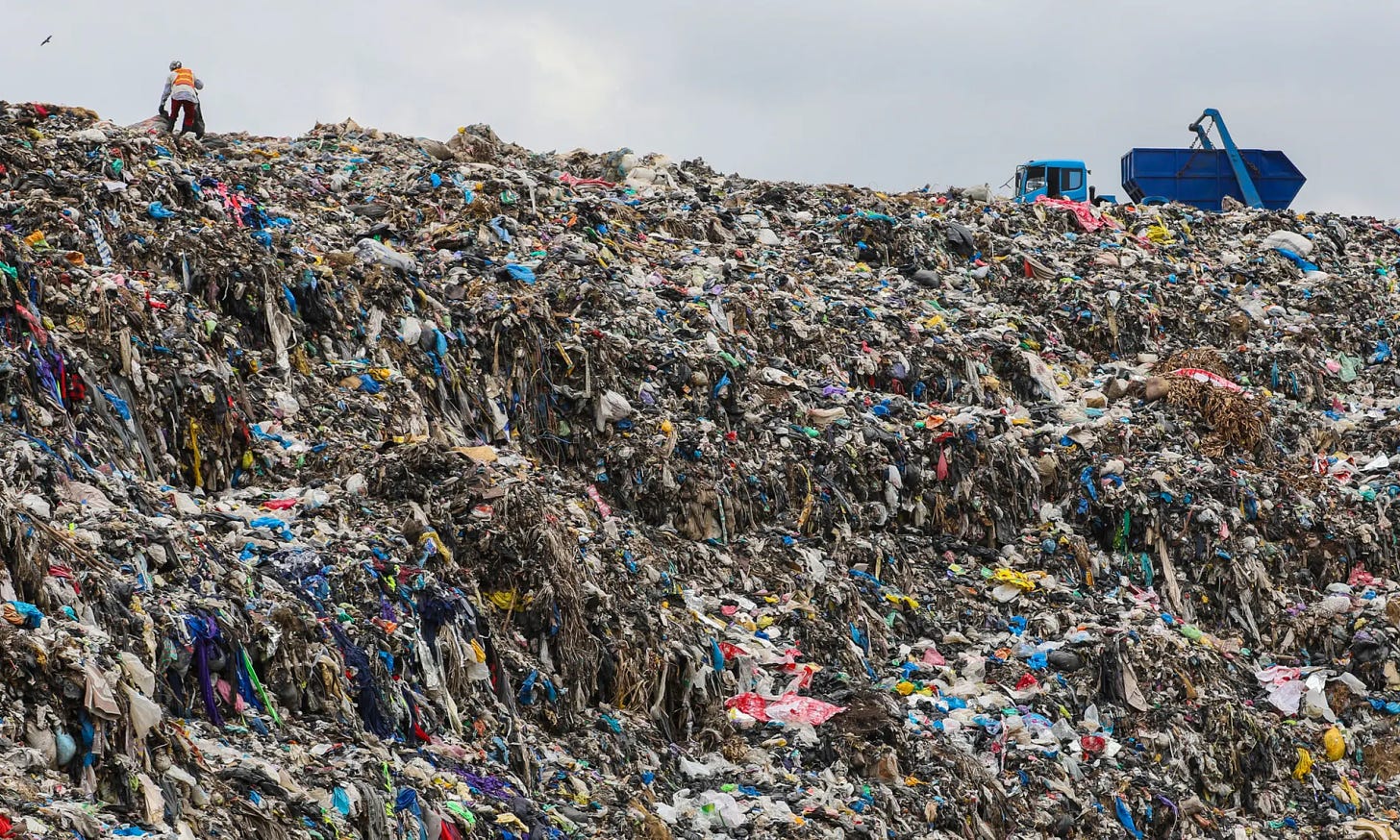
Anti-consumerism for *indirect* footprint impact
The idea here is that even though an individual’s choices are relatively insignificant, their eco-conscious lifestyle can set a good example and inspire widespread culture change, thereby alleviating pressure on planet.
However, this might backfire, provoking resentment and no change in consumption. In “Any Way You Slice It: The Past, Present and Future of Rationing”, Stan Cox summarizes a study:
"Research shows that sometimes people really do become irritated with those who act responsibly, even when it's done completely out of personal motivation, with no boasting or intentional example setting. Rightly or wrongly, we tend to interpret the good deeds of others as implicit criticism of our own actions (or inaction) and that creates ill will … [because it] shakes the perceiver's confidence in being a good, moral person."
Other times, lifestyle changes inspire self-licensing, where someone refrains from consumption in one form but then feels entitled to consume more of something else as a reward, tempering their footprint reduction.

Recycling
Of the plastic that we Americans put in recycling bins, 80% goes to a landfill, 10% gets incinerated, and 10% gets recycled. Greenpeace recently found that it might be only 5-6%. Big oil and plastic producers have lied for over 30 years that plastic recycling is feasible.
In the 10%-or-less of cases where waste management centers do recycle plastics, the process releases microplastics into our water, despite efforts to filter them out. Those particles find their way into rain, soil, food, our testes and semen, our breastmilk and placentae, and our blood and our brains - where they disrupt our hormones, make us infertile and give us cancer. The situation is really lose-lose.
Besides, even perfect recycling could only offset (not stop) resource extraction, because the economic growth imperative demands that we continuously add material into rotation. Recycling applies to what already exists and can’t add to it. If I sold 10 widgets last year and aim to sell 11 this year, then in addition to recycling the 10 existing widgets (ignoring that in reality they might not yet be due for it), I would still need to make the 11th widget.
In terms of “green” energy, it’s prudent to consider authorities’ projections for the total infrastructure that will need to be in-play at any given time, before we evaluate recycling’s material-saving potential. For example, the IEA expects that by 2040 lithium demand will increase 70-fold. Recycling cannot generate that expansion. Companies will meet demand by destroying the Earth.
Finally, recycling is ultimately just another “industrial complex” – one that uses second-hand materials. It can remain operational only as long as we maintain an optimally-functioning civilization with liquid fossil-hydrocarbons to fuel trucking and manufacturing.
Efficiency (without Planetary Cap)
Again, the economic growth imperative reigns. Imagine that factories originally burned one ton of coal to manufacture one car. Then, a new efficient technology requires only half a ton of coal per car. In this case, companies will continue to burn all the coal available to make (and sell) as many cars as possible – let’s say 100 tons of coal and 200 cars. If any company foregoes the opportunity, then the coal vendor will have excess inventory, declare a sale, and another company will snatch it up.
A relevant concept here is Jevons Paradox - explained well in this video.
Tim Garrett voices a concern about how our misunderstandings about civilization and efficiency lead to overly-optimistic IPCC projections. He tweeted this IEA report and commented:
“I worry about the utility of any IEA forecast when their models continue to advocate efficiency gains as a mechanism to reduce climate-changing emissions. This is quite back-to-front. Efficiency gains accelerate climate change because… thermodynamics…. Society uses energy not just to sustain itself energetically but also to grow materially…. We reward efficiency for a reason. It enables us to grow, to overcome any ‘sickness’, to be more consumptive. It’s how we arrived at the luxurious lifestyles many of us enjoy today. The underlying problem here is that many climate economics researchers rely on IEA forecasts to estimate where energy demands are heading in the future. I worry that if the IEA gets this very basic aspect of efficiency wrong, likely all other predictions will be wrong too”
The USA’s Inflation Reduction Act also often fails to consider efficiency improvements’ impact on energy use.

Decoupling
Decoupling refers to when society manages to increase economic activity without proportionate environmental damage. It comes in various degrees. Relative decoupling is when the damage continues to rise as the economy grows, but at a lesser rate. Absolute decoupling is when, as the economy grows, damage decreases. Some countries have achieved absolute decoupling, but not nearly enough to avoid disastrous impacts. From one study: “On average, the 2013–19 decoupling achievements in the 11 high-income countries delivered mitigation rates of 1.6% (range 0.8–4.0) per year. By contrast, the fair-share emissions pathways would on average require mitigation rates of 30% per year by 2025, and 38% per year by 2030.”
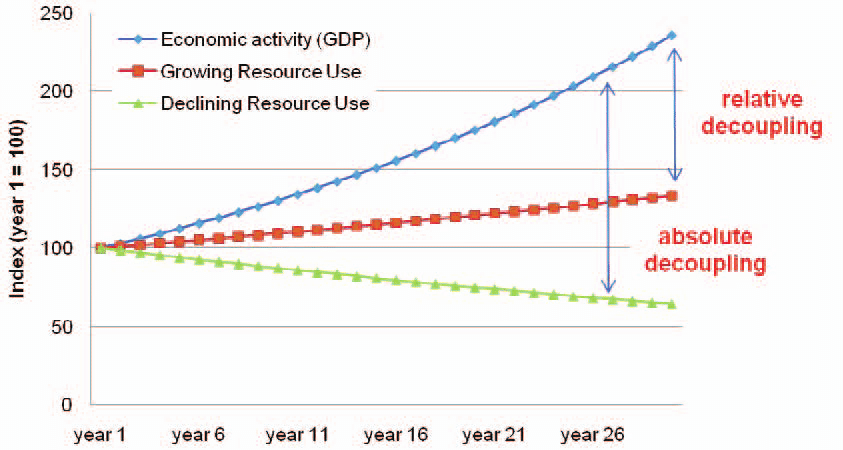
Energy from Other Stocks
Since energy generation from other stocks likewise requires material inputs and extensive infrastructure, this does little to alleviate the pressure on our natural life support system. If you squint really hard at the photos below, you’ll see that the facilities are constructed from stuff which comes from somewhere and also occupy space which, previous to human encroachment, was home to other species.
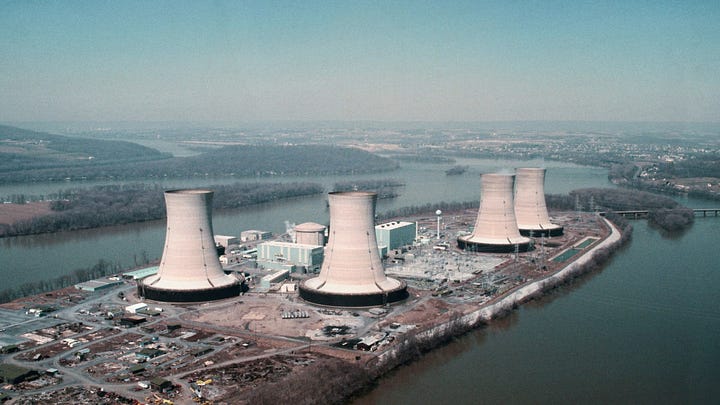
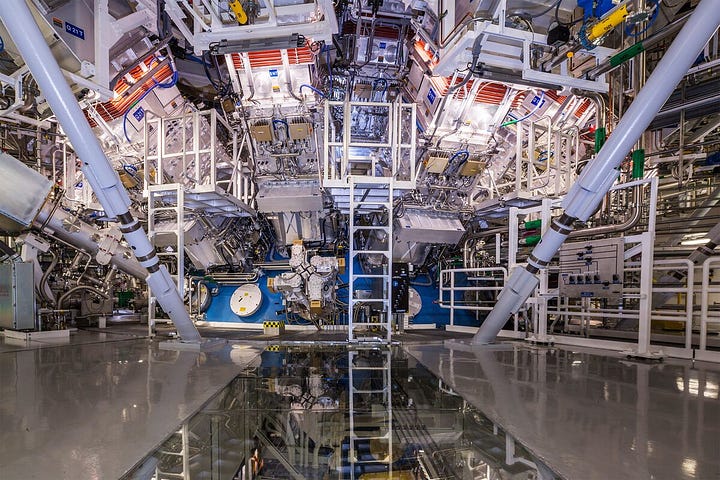
As with the other industrial processes that this post covers, this could remain operational only as long as we maintain an optimally-functioning civilization with liquid fossil-hydrocarbons to fuel the original buildout and ongoing maintenance of infrastructure, plus continuous mining of the feedstock. We’d be going from hundreds of reactors to thousands, all of which would take 10 years to construct, endure 60 years, then require 20 years to decommission. One would hope that we keep tabs on all of them. Oh, and sand for concrete reactors is an issue.
Furthermore, we encounter the usual challenges of “green” energy as opposed to combustable material: They provide only electricity, so we still run into the problem of electrifying processes. The energy is more difficult to store for use beyond the time when we generate it and transmit for use beyond the place where we generate it.
Episodes of “Breaking Down: Collapse” with cited sources in the episode descriptions: Fission & Fusion
Astrophysicist Tom Murphy’s “Energy and Human Ambitions on a Finite Planet: Assessing and Adapting to Planetary Limits” addresses these and a variety of other energy forms. … Plus blog posts about the unfeasibility-at-scale of green hydrogen and biodiesel.
Financial Incentives (Divestment, ESG Funds, Rebates)
The problem that we face stems from resource consumption. The purpose and appeal of money is that it can be redeemed for goods and services, i.e. resource consumption. Therefore, money being spent (or purchasing power being accessed), correlates with a worsening ecological situation. Higher digits in humans’ bank accounts is bad news for all other life. That includes tax rebates; divestment (because you reinvest it in something); and Environmental, Sustainability and Corporate Governance (ESG) investing. These approaches also assume that the current financial system and reliable electricity will endure, which they won’t.
Urbanization / Population Density
To concentrate humans in an urban setting increases resource consumption because the natural resource requirements to satisfy survival needs remains the same, but you burn additional energy to transport food from its rural origin to the city.
Expecting Trees to Sequester Our CO2 and Cool Our Cities
Curveball, I know! It would be nice if the planet complied with what civilized humans imagine is a fair solution, but things are a bit more complicated:
Photosynthesis: Nanoplastics impair photosynthesis. Photosynthesis is how plants convert sunlight to energy, and then (during respiration) to body mass. (this 2024 study)
Respiration: Trees in warmer, drier climates aren’t sequestering as much carbon as we expected. They’re “sending CO2 right back into the atmosphere far more than trees in cooler, wetter conditions”. Trees release CO2 as part of the respiration process, when they use the sugars that they created through photosynthesis to grow. (from this 2024 study)
Transpiration: Above 93°F, trees reduce their transpiration rate. (Transpiration is similar to how the human body sweats too cool off, but beyond a certain point, it becomes ineffective and comes with the cost of dehydration, so the body “shuts off” sweating. It’s also how plants transport nutrients throughout their bodies.) Less transpiration means less cooling effect around them. Cities, meanwhile, trap more heat than the surrounding landscape - know as the “urban heat island” effect. Now it appears that, the worse this effect gets, the less trees will alleviate it. (this 2024 study)
So, lo and behold … In 2023, global anthropogenic CO2 emissions increased by “only” 0.6% ± 0.5, yet the atmospheric CO2 concentration at Mauna Loa increased by 3.37 ppm ± 0.11, an 86% increase over the previous year. “This implies an unprecedented weakening of land and ocean sinks.” (from this 2023 study and here’s the Guardian’s coverage)
Another snag is that, when humans plant trees, if the greenness darkens the landscape, it reduces the albedo effect (reflection of solar radiation). The increased radiation absorption counters the carbon sequestration benefits.
Creating a “Purpose Trust” and “making Earth your only shareholder”
Regardless of whether Patagonia’s move is a step in the right direction, it incorrectly gives the impression that corporate offices and websites will continue to exist, and that major retailers need only make some tweaks to “green” their business models to make the preservation of Normal possible.
Steady State Economy
Center for the Advancement of the Steady State Economy (CASSE) is a U.S. nonprofit inspired by Herman Daly’s work. Alas, any civilization -no matter how modest- is inherently so resource-hungry that it cannot exist in a harmonious relationship with its environment.
High-Tech Food Production
No method of fertilizer synthesis is as efficient as the Haber-Bosch process.
Each of the following approaches faces challenges and, maybe more importantly, won’t function in the absence of “normal” conditions (e.g. long-distance supply chains, reliable electricity and stable climate):
Vertical/Indoor farming issues
Biofortification issues
Lab-grown meat issues
Precision fermentation issues
Goodreads page for “Stop Saving The Planet!: An Environmentalist Manifesto”
article, “Electric Cars Are a Fix for Capitalism, Not the Planet”
a “Breaking Down: Collapse” episode about electric vehicles, with shownotes




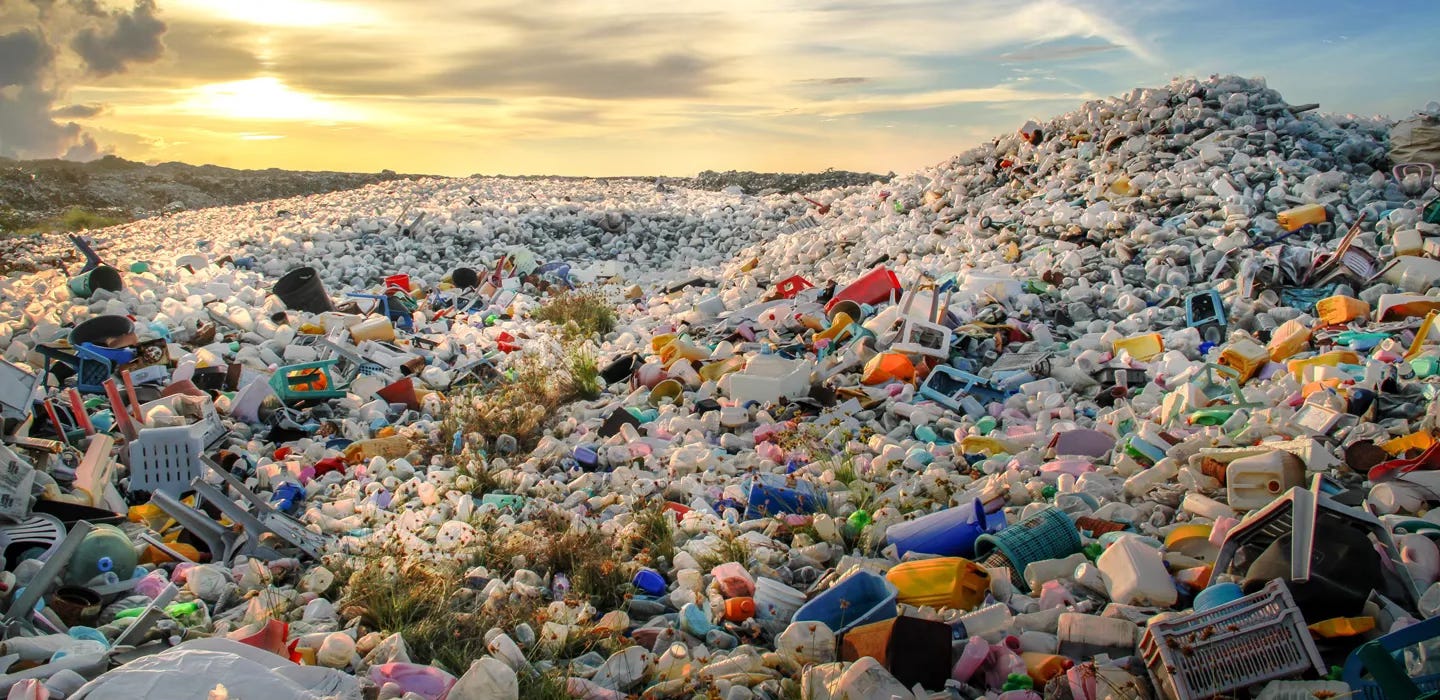

MMT probably doesn't belong in this list as it is first and foremost a description of how sovereign currency functions. We've had currency for ~4,000 years, but we've only been engaged in omnicide for the last ~300.
For example, members of the degrowth community are attempting to use MMT as their monetary basis, see: https://www.sciencedirect.com/science/article/pii/S0921800923002318?via%3Dihub